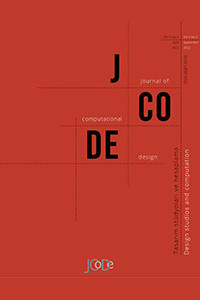Kişiselleştirilmiş yönlendirme için deneyime dayalı bir yöntem
Etmen Tabanlı Modelleme, Kitle Kaynaklı Veriler, Nesnelerin İnterneti, Kişiselleştirilmiş Navigasyon., Agent-based modelling, Crowdsourced Data, IoT, Multi-user, Personalized Routing.
An experience-based method for personalized routing
Etmen Tabanlı Modelleme, Kitle Kaynaklı Veriler, Nesnelerin İnterneti, Kişiselleştirilmiş Navigasyon., Agent-based modelling Crowdsourced Data, IoT, Multi-user, Personalized Routing., Agent-based modelling, Crowdsourced Data, IoT, Multi-user, Personalized Routing.,
___
- Gunantara, N. (2018). A review of multi-objective optimization: Methods and its applications. Cogent Engineering, 5(1). https://doi.org/10.1080/23311916.2018.1502242
- Huang, H., Klettner, S., Schmidt, M., Gartner, G., Leitinger, S., Wagner, A., & Steinmann, R. (2014). AffectRoute – considering people’s affective responses to environments for enhancing route-planning services. International Journal of Geographical Information Science, 28(12), 2456-2473. https://doi.org/10.1080/13658816.2014.931585
- Kengpol, A. (2008). Design of a decision support system to evaluate logistics distribution network in Greater Mekong Subregion Countries. International Journal of Production Economics, 115(2), 388-399.
- Liu, T. K., Moskowitz, P. A., Greenwood, M. C., Lieberman, L. I., & Wood, D. A. (2002). System for personalized mobile navigation information. U.S. Patent No. 6,349,257. Washington, DC: U.S. Patent and Trademark Office.
- Majid, A., Chen, L., Chen, G., Mirza, H. T., Hussain, I., & Woodward, J. (2013). A context-aware personalized travel recommendation system based on geotagged social media data mining. International Journal of Geographical Information Science, 27(4), 662-684. https://doi.org/10.1080/13658816.2012.696649
- Mermelstein, Y. Z. (2017). Method and system for providing personalized navigation services and crowd-sourced location-based data. U.S. Patent Application No. 15/187,400. Ng, A. (n.d.). Machine learning. Coursera. https://www.coursera.org/learn/machine-learning
- Palanca, J., Terrasa, A., Rodriguez, S., Carrascosa, C., & Julian, V. (2021). An agent-based simulation framework for the study of urban delivery. Neurocomputing, 423, 679-688.
- Payne, A. (2016, October 25). Firefly. Food4Rhino. https://www.food4rhino.com/app/firefly
- Quan, J. C., & Cho, S. B. (2014, June). A hybrid recommender system based on AHP that awares contexts with Bayesian networks for smart TV. In International Conference on Hybrid Artificial Intelligence Systems (pp. 527-536). Springer, Cham.
- Sha, W., Kwak, D., Nath, B., & Iftode, L. (2013, February). Social vehicle navigation: integrating shared driving experience into vehicle navigation. In Proceedings of the 14th workshop on mobile computing systems and applications (pp. 1-6).
- Smuts, C. (n.d.). Mosquito – Synthetic spaces. Synthetic Spaces-Conceptual Explorations of the Evolving Dimenions- Architecture, Industrial Design, Furniture. https://www.synthetic.space/synthetic/2443/
- Sopher, H., Schaumann, D., & Kalay, Y. E. (2016). Simulating Human Behavior in (Un) Built Environments: Using an Actor Profiling Method. International Journal of Computer, Electrical, Automation and Information Engineering, 10(12), 2030-2040.
- Wan, L., Hong, Y., Huang, Z., Peng, X., & Li, R. (2018). A hybrid ensemble learning method for tourist route recommendations based on geo-tagged social networks. International Journal of Geographical Information Science, 32(11), 2225-2246. https://doi.org/10.1080/13658816.2018.1458988
- Zheng, W., & Liao, Z. (2019). Using a heuristic approach to design personalized tour routes for heterogeneous tourist groups. Tourism Management, 72, 313-325. https://doi.org/10.1016/j.tourman.2018.12.013
- Zhu, X., Hao, R., Chi, H., & Du, X. (2017). FineRoute: Personalized and time-aware route recommendation based on check-ins. IEEE Transactions on Vehicular Technology, 66(11), 10461-10469. https://doi.org/10.1109/tvt.2017.2764999
- Yayın Aralığı: Yılda 2 Sayı
- Başlangıç: 2019
- Yayıncı: İstanbul Teknik Üniversitesi
Mimarlığın Dijital Habitusu: Tasarım odaklı İnternet Kullanım Pratiği
Hanife Sümeyye TAŞDELEN, Leman Figen GÜL
Bir Tasarım Araştırması Olarak Eğrisel Çizgiyi Araçlaştırmak
Mimarlıkta Sayısal Tasarım Pedagojisi Bağlamında Enformel Öğrenme
Asena Kumsal ŞEN BAYRAM, Orkan Zeynel GÜZELCİ, Sema ALAÇAM
Mekânsal Algının Görsel Temsil ve Yazılı Anlatı Üzerinden Ölçülmesi
Mimarlıkta Temsilin Dönüşümünü Ayrık Paradigması Üzerinden Sorgulamak
Kişiselleştirilmiş yönlendirme için deneyime dayalı bir yöntem
